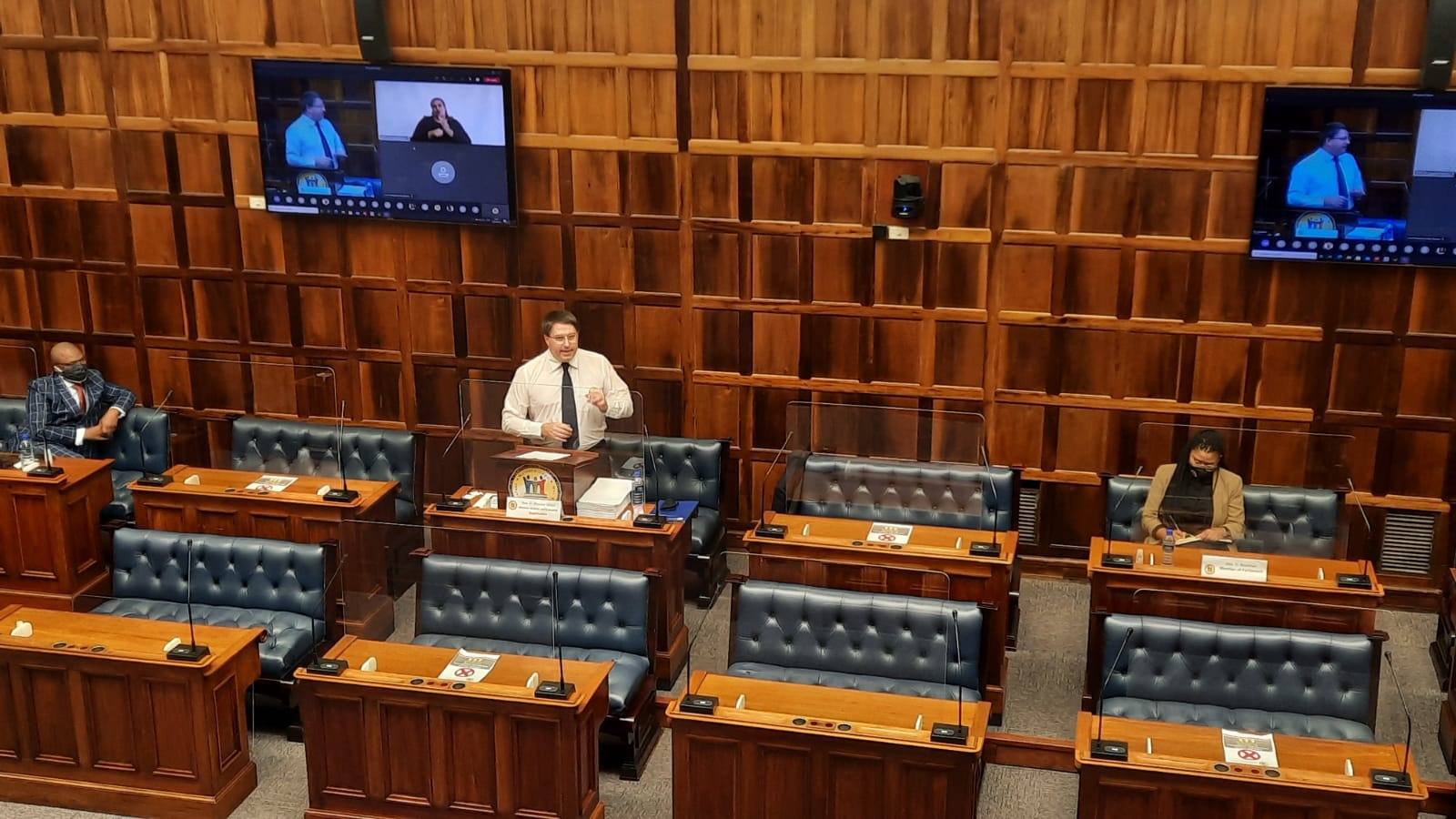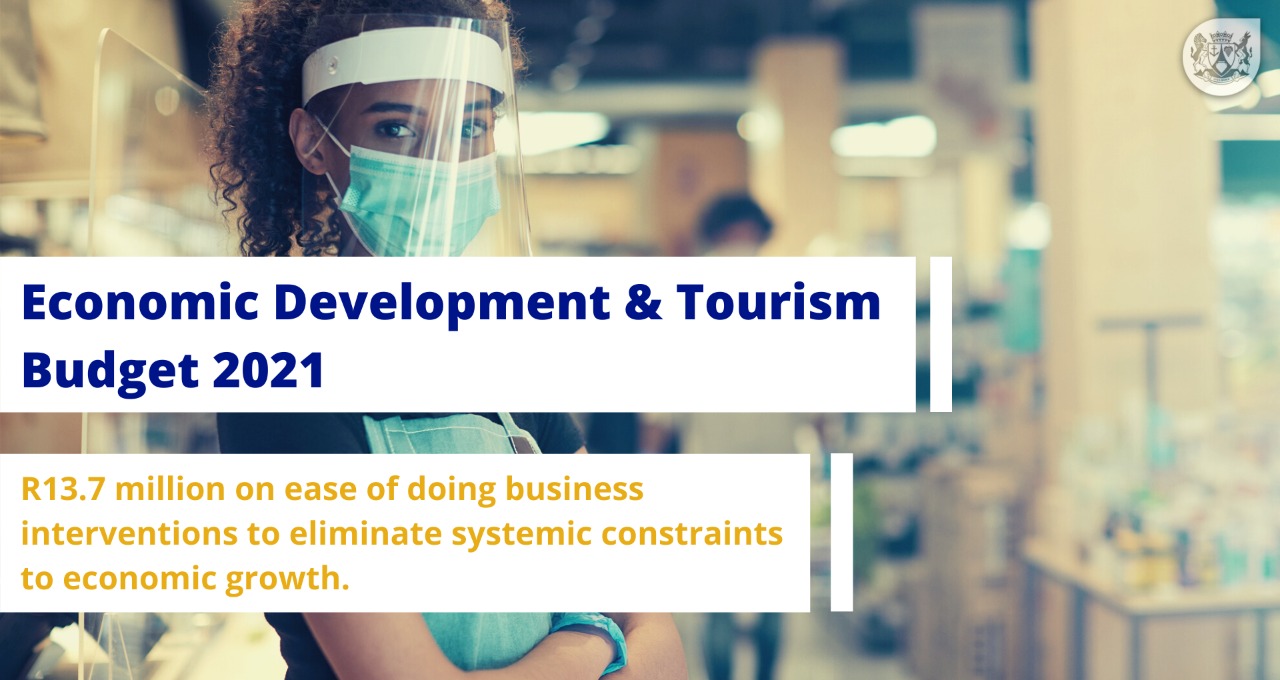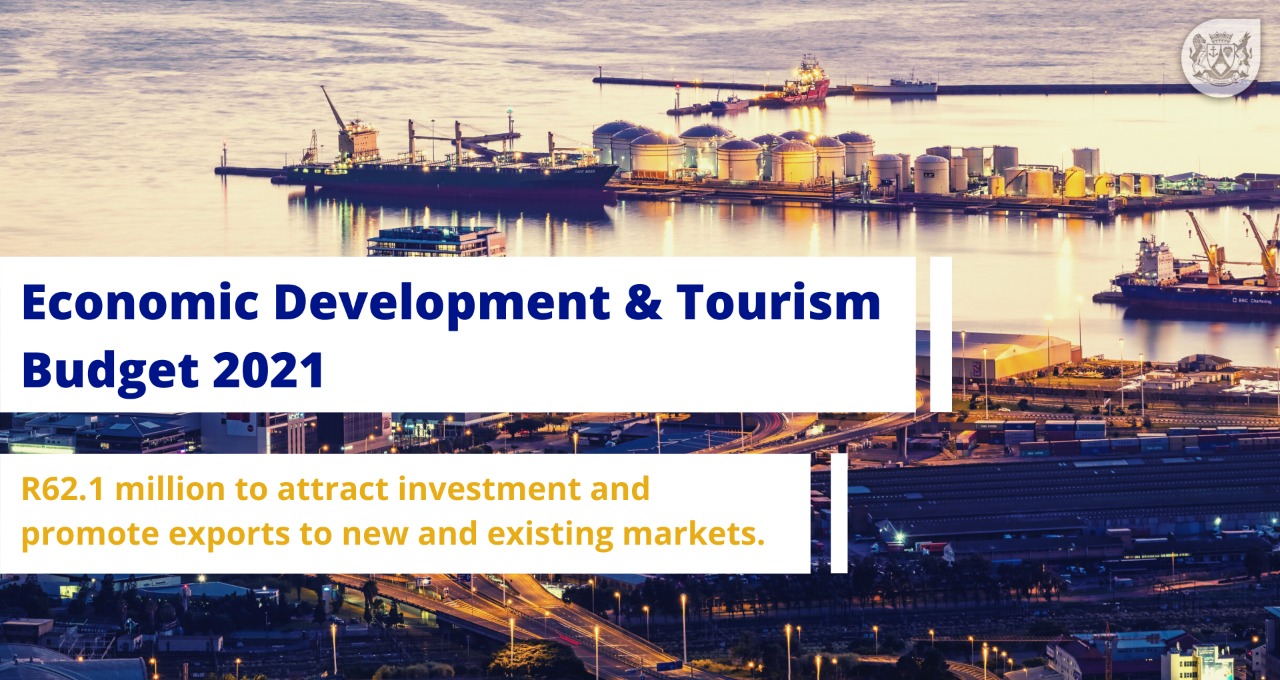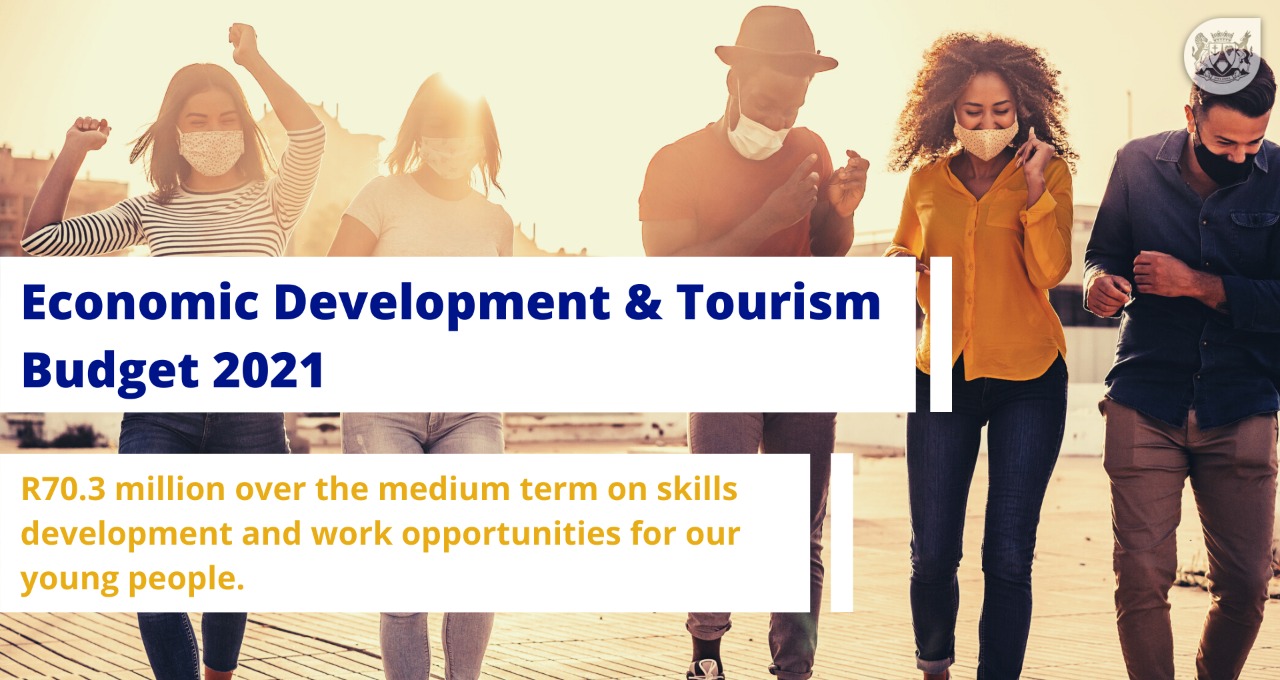
Speech
Appropriation Bill 2021: Dept. of Economic Development and Tourism (Vote 12)
Two weeks ago, we tabled “A Budget for Hope”, which is a budget that provides hope because it supports job creation, because it builds safer communities and because it delivers well-being in the Western Cape.
Importantly, in the end, the budget provides hope because it supports our plan to defeat COVID-19, which is destroying lives, and which is destroying livelihoods, in the Western Cape.
We know the economy in the Western Cape has been hard-hit by the COVID-19 pandemic, and businesses continue to face many challenges resulting in considerable job losses.
The second wave over our peak tourism season had a significant impact on our economy and on jobs as the lockdown level 3 regulations directly affected some of our key job sectors including tourism, hospitality and agriculture in the Western Cape.
We stepped up and worked hard to support small businesses during these challenging times, especially in the tourism and hospitality sector, through our:
- workplace safety initiatives;
- business support centres;
- relief funds; and
- award-winning tourism promotion campaigns and more.
We are seeing encouraging signs of economic recovery in the Western Cape with 121 000 new jobs in the last quarter, the highest increase of all provinces in South Africa.
As lockdown restrictions ease and global economic growth and demand reignites, the provincial economy is expected to recover at 4.6 per cent in 2021 and 3.1 per cent in 2022.
The Department, together with Wesgro, will play a central role in the Western Cape Recovery Plan and the delivery of the Premier’s “North Star” priority of “Jobs”.
Today we table the Main Appropriation of Vote 12: Department of Economic Development and Tourism, which allocates R517.807 million in 2021/22 to create jobs in the Western Cape.
We will do this by:
- accelerating the ease of doing business;
- boosting private sector investment and promoting exports;
- increasing spending on infrastructure;
- scaling up work opportunities; and
- ensuring economic resilience in the Western Cape.
Tackling Barriers to Growth
To create jobs, we will:
- spend R13.7 million in 2021/22 on ease of doing business interventions, to eliminate systemic constraints to economic growth, such as visa regimes, port tariffs, trade barriers and planning delays which will make it easier to start a business, or to expand a business.

Since its launch, our Red Tape Reduction Unit has helped thousands of businesses tackle inefficient government bureaucracy that restricts their growth.
In this financial year alone, they have dealt with over 1 270 cases, maintaining an overall resolution rate of 80 per cent.
Based on the Red Tape Reduction Unit’s impact to date, we will be scaling it up to an Ease of Doing Business Unit, which will address systematic issues at their core to significantly improve the ease of doing business in the Western Cape.
A major focus of our Ease of Doing Business Unit is the Port of Cape Town, which is facing significant challenges as a result of ageing infrastructure and equipment, staffing shortages, the COVID-19 pandemic and high winds.
The result is that vessels have been bypassing the Port or waiting eight to twelve days before they can berth, negatively impacting businesses across the port logistics supply chain, causing significant delays and financial losses.
In the end, the current terminals at the Port are simply not able to service the volume of cargo that can potentially flow through Cape Town.
To collaboratively address these challenges, we established a Port Task Team at the end of 2019, which is coordinated by our Ease of Doing Business Unit, and has brought together key representatives from all levels of the port logistics supply chain to solve some of the critical issues at the Port.
Despite the COVID-19 pandemic diverting the efforts of many of the stakeholders, some important successes were achieved.
However, the Port remains a binding constraint on economic growth in the Western Cape and requires urgent intervention.
And so, I have also been meeting with the CEO of Transnet Port Terminals, Velile Dube, to talk about what can be done both in the short-, medium- and long-term to generate efficiencies in the Port.
In the meantime, our Ease of Doing Business unit will continue to work closely in collaboration with the Transnet Port Terminals management to escalate urgent and critical issues and identify quick-win solutions to the congestion challenges at the Port.
In fact, in the next two weeks, they will complete two studies to identify opportunities for improved efficiencies:
- The first will integrate all pallet-level information on fruit exports to create a planning tool for the two container terminals at the Port; and
- The second will identify root causes of transporter congestion and recommend solutions to improve truck turnaround time at the Port.
Our Plan to Boost Exports
To create jobs, we will:
- Spend R62.1 million in 2021/22 to attract investment and promote exports to new and existing markets through Wesgro.

We are already an export powerhouse, exporting 40 per cent of South Africa’s agriculture and agri-processing products.
Even during a challenging 2020, agricultural exports saw significant growth, increasing by 23.8 per cent to a value of R77.14 billion.
This trend is expected to continue into 2021 and beyond.
Which is why the Department, together with Wesgro, are developing a Western Cape Export Strategy to define our vision to boost exports over the next five to ten years.
This strategy will:
- Identify opportunities and constraints within existing policy;
- Identify opportunities in existing key markets;
- Identify opportunities in new markets and new commodities; and
- Review existing capacity in logistics, infrastructure and business processes to define a road map for what is needed to realise our vision to boost exports in the Western Cape.
In the meantime, Wesgro’s export unit continues to promote exports to new and existing markets with:
- virtual or hybrid export promotion and outward foreign direct investment “missions”, of which 47 are planned for the upcoming year;
- training courses to help businesses become export ready; and
- webinars and online workshops to keep exporters in the Western Cape updated and informed of new opportunities.
Other initiatives include the Cape Export Network in partnership with Wines of South Africa, which is the only B2B online marketplace for international buyers to source South African wines.
110 wineries are already listed on the Cape Export Network, featuring over 300 wines, and we’d like to invite all South African wine producers to register and list their products for free.
And I am excited about our inaugural Cape Agriculture Export Week, which is taking place tomorrow, and which is an online trade exhibition to showcase our agricultural and agri-processing industry in the Western Cape.
Investing in Catalytic Infrastructure
To create jobs, we will:
- Spend R37.3 million in 2021/22 on the Atlantis Special Economic Zone and R40 million in 2021/22 on the Saldanha Bay Industrial Development Zone, both of which will play a critical role in attracting and increasing spending on infrastructure.
4.1. Atlantis Special Economic Zone
At the end of last year, we reached a critical milestone for our Atlantis Special Economic Zone, with the Cabinet approval and finalisation of the purchase of land for the Atlantis SEZ Company, from the City of Cape Town, in exchange for minority shareholding.
The conclusion of this land transfer is a critical step in the development of the Atlantis SEZ as it allows the company to attract and engage investors independently over the next three years.
As the shareholder of the Atlantis SEZ, we have worked hard to support the establishment of this green-tech, export-orientated manufacturing hub to establish ourselves as “Africa’s Green Economy capital”.
Twenty-five hectares of the Atlantis SEZ has already been built up through four investors, totalling R680 million and creating around 300 jobs. All in operation.
There is also a significant pipeline of investments in development with the Atlantis SEZ seeking to recruit suitable investors to the value of R600 million, enabling over 1 000 direct jobs in new energy generation technologies and other green tech investments over the next three years.
4.2. Saldanha Bay IDZ
The Saldanha Bay IDZ has also showed great resilience and made significant progress in its strategic goals over the last year.
They have:
- created 2 000 jobs;
- completed the construction of the Access Complex, a landmark commercial facility already housing three businesses and in the process of signing a fourth;
- continued to service eight businesses in the Saldanha Bay IDZ, with two more factories currently under construction, both on schedule to be completed this year; and
- supported local small businesses through the Co-Lab facility which provides free WiFi, hot desks, printing and meeting facilities, and has been a welcome relief to small businesses who have visited over 1 500 times.
The Saldanha Bay IDZ is on track to realise its commercial potential and has grown and secured an active investor pipeline, currently valued at over R21 billion.
We remain committed to working with all stakeholders to convert the interest from investors into fully operational infrastructure and facilities supporting our vision of economic growth and job creation in Saldanha Bay, the West Coast and the Western Cape.
Skills Development and Work Opportunities
To create jobs, we will:
- Spend R70.3 million in 2021/22 on skills development and work opportunities, so that our young people have the right skills to fill the jobs available now and in the future.

Our Work and Skills Programme works in partnership with government, civil society and business to create experiential learning and work placement opportunities for unemployed youth in the Western Cape.
Through these co-funded programmes, we provide stipends of between R3 000 to R3 500, to support 4- to 12-month work placements for young people between the ages of 18 and 35 years, giving them on-the-job training in critical skills areas.
Our programme has proven to highly successful, particularly in the Business Process Outsourcing sector where have seen an exceptionally high up-take of young people moving into permanent employment following their work placements.
In the last financial year, we allocated R30 million to provide stipends to 1 700 new BPO agents for on-the-job training in call centres in the Western Cape.
And next week I will be visiting a global BPO company based here in Cape Town, which has offered full-time contracts to 234 young people following completion of their on-the-job training.
And I am pleased to announce that we have allocated a further R31.44 million in 2021/22 to continue supporting this successful initiative to create more opportunities for young people in the Western Cape.
Energy Resilience
To create jobs, we will:
- Spend R28.8 million in 2021/22, with a further R20 million in the provincial reserves, for the Municipal Energy Resilience project, which is a bold, and ambitious, project to support municipalities to generate, procure and sell their own power so that we can beat load shedding in the Western Cape.
In my budget speech I was pleased to announce the candidate municipalities participating in the Municipal Energy Resilience Project.
We will now begin working closely with them in the first phase of the project to identify pioneering energy projects and develop a roadmap to roll out these projects.
I am excited about the Municipal Energy Resilience Project because we need all the energy we can get, as quickly as possible.
A great deal of work has already taken place over the past decade to develop the green economy in the Western Cape, and we will continue to work hard to build a greener, more energy secure province.
Conclusion
In the end, economic recovery depends on vaccinating as many people, as fast as possible, because with more jabs, there will be more jobs.
Our “Budget for Hope” supports our recovery plan, supports our vaccination strategy and supports the fight against COVID-19.
And what is crucial in rolling out the vaccine strategy is our partnership with the private sector.
And so, we will be holding a series of engagements with business to discuss how we can work together to ensure a successful and rapid rollout of vaccines in the Western Cape.
In conclusion, I would like to thank the Head of the Department, Solly Fourie, and “Team DEDAT” for their efforts to support businesses and save jobs during what has been an incredibly challenging time.
We remain committed to working together with the private sector so we can rebuild the economy and create jobs, because people who have jobs have hope.
Watch the livestream recording here >> https://www.youtube.com/watch?v=hw14zftz-Yc
Francine Higham
Spokesperson for the Ministry of Finance and Economic Opportunities
(Responsible for Provincial Treasury and Departments of Economic Development and Tourism)
Tel: 021 483 4327
Cell: 071 087 5150
Email: francine.higham@westerncape.gov.za


